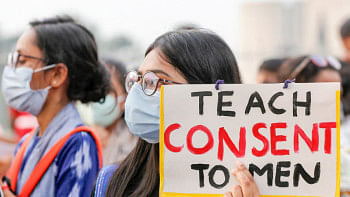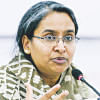How the landless are leading the fight against sexual violence in schools
At the beginning of 2020, Angarpara Government Primary School in Dinajpur's Khansama union welcomed a new assistant teacher for its students. The 53-year-old teacher, who initially seemed friendly towards students, would make excuses to inappropriately touch female students and compel them to watch pornographic content with him. If anyone refused to respond to his attempts or wanted to inform their parents of the harassment, he would resort to physical torture or threaten them with poor grading.
"My daughter, who is in Class 4, told me about this particular teacher's behaviour a long time ago. Initially, I did not believe her. But then she started showing reluctance about going to school," said Minara*, a parent.
During his two-year term, the teacher harassed at least six students, all belonging to primary classes. On January 22 this year, some students finally informed their parents of the issue, who then complained to the school's teachers. The accused teacher had faced similar allegations in other schools of the upazila where he had worked.
"Recently, I heard a few of her classmates making the same complaints. So, we took it up to the headmaster," Minara added.
With the help of the local Landless Peasants' Organisation, Khansama UNO was informed of the matter. The UNO authorised the upazila education officer to investigate the allegations on February 1, after which a public hearing was held on the issue.
The allegations were proven to be true. Amid many protests from locals, a memorandum was submitted to the UNO by the Landless Organisation, demanding the permanent suspension of the accused teacher. Similar memoranda were sent to Dinajpur DC Khaled Mohammad Zaki and to the District Education Officer (DEO). A temporary suspension order was issued against the accused, which was implemented with immediate effect.
While collecting information regarding this incident, it was revealed that the school, though a government institution, had no anti-sexual harassment cell or complaint committee, despite there being clear directives from the High Court in this regard.
"After the incident came to light, we repeatedly asked the school to form a complaint committee. The school authorities said they never received any official order to form a committee and that these incidents rarely occur at the school. However, we have continued our advocacy on this front," said Kallyani Sarkar, representative of the Landless Organisation in Dinajpur.
In November 2021, Plan International Bangladesh published a national-level study conducted on 2,232 girls and young women aged between 10-24 years and 2,208 boys and young men from the same age group, covering both urban and rural areas. The study revealed that 73.8 percent of girls and young women faced sexual harassment in their respective educational institutions. Khulna ranked the highest (89.7 percent), followed closely by Barishal (80 percent) and Rajshahi (78.8 percent). Around 52.5 percent informed their parents, 31.6 percent told their teacher, and only 1.4 percent informed the local police.
Due to the absence of a functioning complaint mechanism, most cases are settled in meetings attended by local leaders and teachers. Guardians and family members of the survivors eventually give in, so as to protect their children's character from being assassinated.
"We filed a case when my six-year-old granddaughter was raped by her madrassa superintendent. The perpetrator was arrested, but later we dropped the case and settled as we did not want word to spread," said Anwara* of Khulna's Paikgachha upazila.

These incidents have a serious impact on the survivors. Among those surveyed by Plan International Bangladesh, 90.2 percent fell into depression, while 55.9 percent remained silent about the harassment. Around 6.2 percent stopped stepping out of their houses, while 9.6 percent dropped out of school. What's more staggering is that 35.3 percent of girls were forced into child marriage due to their parents' fear of them being sexually harassed.
Rahima*, who is from Etbarpur in Cumilla's Chandina upazila, said, "Some boys of the neighbourhood used to harass my daughter in front of her school when she was in Class 7. We wanted to protect her from being judged for this, so we sat down with the school teachers and local leaders, who warned the boys against repeating their behaviour.
"Later that year, we had to marry her off. She still attends school and is in Class 9 now. The incidents have not been repeated," she added.
In 2009, the High Court issued a directive that requires active anti-sexual harassment cells in all educational institutions and workplaces, after pointing out the absence of a legislative provision and formal mechanisms to address sexual harassment. An education ministry circular from April 22, 2010 asked all educational institutions to form such committees within three weeks. However, very few institutes complied with the directives.
How landless groups compelled local schools to stand against sexual violence
Some small changes have taken place over the years, in the lesser-known schools of the outskirts rather than the reputed ones in the cities, through the efforts of members of the Landless Organisation in those areas.
It all began in 2018. Three school students were sexually harassed in a small village called Jhapra under Dhangora union in Sirajganj's Raiganj upazila. A protest erupted, led by the Landless Organisation in the area, demanding justice and the implementation of the HC directives.
Following the protest, a committee meeting of the landless groups on May 20, 2018 decided that information will be collected regarding the formation of a harassment complaint committee in the concerned school—GKA Mannan High School—using the Right to Information (RTI) Act.
When we started pushing the schools to form complaint committees following the HC guidelines, most school authorities said they were not aware of any such directives. They would only comply if there was an official order, even though the HC guidelines clearly stated the committees must be formed within 60 days of the ruling, without any issuance of a circular."
On May 25, 2018, Laili Begum, a member of the landless group, filed an application with the school's headmaster under the RTI Act, asking for information regarding the complaint committee.
At first, the application was ignored by the school authorities. On July 12, Laili filed an appeal with the Upazila Education Officer, who responded to it on August 19, informing that there were no such committees in the school. The education officer also wrote to the headmaster of GKA Mannan High School, who finally took the issue into account and invited Laili to the school to conduct a discussion on August 27, 2018.
After Laili explained the guidelines to the school and provided copies of the HC directives to teachers and other stakeholders, the school finally formed a five-member complaint committee in September of that year, including Laili Begum as a member.
However, this was in no way an easy task to accomplish.
"When we started pushing the schools to form complaint committees following the HC guidelines, most school authorities said they were not aware of any such directives. They would only comply if there was an official order, even though the HC guidelines clearly stated the committees must be formed within 60 days of the ruling, without any issuance of a circular," said Rezanur Rahman Rose, programme coordinator of Nijera Kori, an NGO which facilitates the activities of the Landless Organisations.
Parul Begum, member of the landless group and of the complaint committee at Kochuahat Uchcho Balika Bidyaloy in Rangpur, said, "We went to talk to teachers of the school and told them about the committee. Teachers were at first sceptical about how effective this would be, but they were aware of the extent of sexual harassment. We convinced them and now the committee has been formed."
The landless groups also realised that, instead of submitting RTI applications to individual schools, they could apply directly to the Upazila Education Officers and then mobilise for the implementation of the HC guidelines. This implied that complaint committees could also be formed in schools in the upazila that are not in working areas.

"The Landless Organisation came and told us that it was necessary to form a sexual harassment complaint committee. We also received a directive from the Upazila Education Officer," said Akter Hossain Babul, headmaster of Pankhar Bazar High School in Noakhali's Subarnachar.
"We were previously aware of the guidelines but did not see the need for them since there had not been any major incidents in our schools. The parents are very supportive of our initiative. Till now, a few minor incidents have been dealt with through the committee," Babul added.
In June 2019, complaint committees were formed in 107 educational institutions, including 65 secondary schools, 28 madrasas, and 14 colleges, in Khulna's Dumuria upazila, with the initiative of the Landless Organisations and the direct involvement of the Upazila Education Officer Firoz Ahmed.
This instilled a great amount of confidence and a sense of security against sexual violence in the students of these schools.
Jyoti Biswas, a student of Thana Headquarter Maddhomik Bidyaloy in Khulna's Batiaghata, said, "I used to feel unsafe because of how a past rape incident in the same area and the lack of response to do anything about it. I think the complaint committee is a good initiative. However, I also think the committee should play a greater role in ensuring our [the students'] participation in the process."
The Landless Organisations, facilitated by Nijera Kori in different regions across the country, submitted 51 applications under the RTI Act to collect information regarding the sexual harassment complaint committees in local schools—whether complaint committees have been formed, and if they did exist, for the names of the members. Of the 51 applications, 44 applications were made to school principals and seven requests were made to the assistant upazila education officer.
Previously, information was received from 46 schools and, with the exception of one school, the remaining 45 had no such committees. The Landless Groups' mobilisation activities resulted in the formation of sexual harassment complaints committees in 344 schools in Dhaka, Chattogram, Rajshahi, and Khulna.
The fight goes on
However, huge setbacks have taken place during the Covid-19 pandemic. Due to the closure of schools, most of these committees became inactive and did not resume their activities even after the schools reopened.
Fazlul Haque, Dhaka divisional coordinator of Nijera Kori said that 47 committees were formed in three working areas under Dhaka.
"Most of them have become inactive following the pandemic. In the few schools where committees have been renewed, even the committee members are unaware of their own membership status. No formal complaints are made, and when an allegation is raised, the school authorities try to settle things informally," said Fazlul.
The situation described by Fazlul is reflective of the current state of most of the committees formed during 2018-19, according to sources in Nijera Kori.
Only 71 percent of educational institutions and 39 percent of workplaces have formed a sexual harassment complaint committee as per the HC directives. Only 44 percent of these committees are effective, while 57 percent of them do not have complaint boxes to report the incidents as per the guidelines, revealed Bangladesh National Women Lawyers Association (BNWLA) in November last year.
However, Md Abul Khair, information and public relations officer at the Ministry of Education, said, "As per my knowledge, all educational institutions in the country have anti-sexual harassment cells. Besides, the ministry only works at the policy formulation level, the implementation is up to the directorates under the ministry."
Reports published by Ain o Salish Kendra's (ASK) documentation unit suggest that 23 children have been sexually harassed by their school teachers in the last year. Four cases have been filed in connection to these incidents. A total of 52 young boys have been sexually harassed, of whom 32 were between the ages of 7-12 years.
In 2021, ASK filed a writ petition for the lack of implementation of the HC guidelines. Consequently, on January 9, 2022, the HC issued a rule asking the authorities concerned to explain why their inaction and failure to implement the 2009 HC directives should not be declared illegal.
Nina Goswami, ASK's director of programmes, said, "When this rule did not bring any significant change in the scenario, we applied to the High Court once again on November 30, 2022. On January 10 this year, the High Court directed the authorities concerned to constitute committees for preventing sexual harassment at all educational institutions across the country. The education ministry and University Grants Commission have been asked to implement this directive in compliance with the 2009 HC verdict."
When asked about their future course of action to make the committees active again, Fazlul said, "We are conducting regular in-person workshops in these schools to raise awareness in this regard and make the committees functional. We are planning to form fully-fledged sexual harassment prevention committees in every school inside our working area, with 10 female students, 8 male students, a teacher, and one healthcare representative from the government's end."
Advocate Ferdous Nigar of the BNWLA said, "While preparing the report we published last year, it was found out that most institutes do not even have a functioning complaint committee. Every institution has to follow the HC directives as per Section 111 of the Constitution."
"The government bodies responsible for the implementation of the HC guidelines need to be pressurised in this regard, as there is a lack of follow-up or monitoring of the institutes on their end," she added.
(*Names have been changed upon request)
Nahaly Nafisa Khan is a journalist at The Daily Star.

 For all latest news, follow The Daily Star's Google News channel.
For all latest news, follow The Daily Star's Google News channel. 










Comments